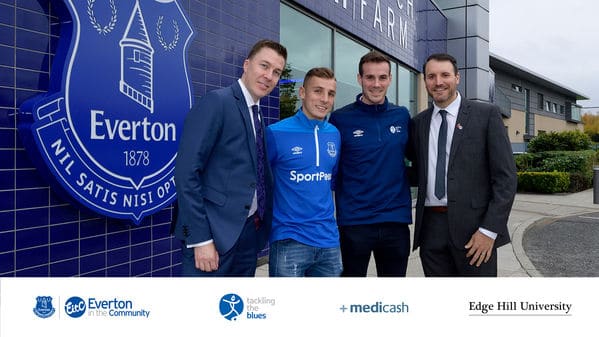
Leading health cash plan provider Medicash has provided vital funding for Everton in the Community (EitC) to deliver accredited mental health training for teachers across Merseyside to help support children and young people experiencing – or at risk of experiencing – poor mental health.
Medicash has donated £10,000 to the official charity of Everton Football Club, and the funds will enable EitC to deliver a one-year intervention programme which will see 50 teachers receive training, ensuring they are fully equipped to provide support to their pupils for many years to come.
The training will be a much welcome boost to the ‘Tackling the Blues’ project, delivered jointly by Everton in the Community and Edge Hill University. The project was established in January 2015 in response to the alarmingly high prevalence of mental illness amongst children and young people.
Liverpool is ranked the third lowest in England for child wellbeing and 78% of five to 15-year-olds with anxiety or diagnosable depression are not in contact with mental health services.
Michael Salla, Director of Health and Sport at Everton in the Community said: “This important support from Medicash will help teachers to sooner identify and better support children and young people who may be experiencing poor mental health. Half of all adult mental illnesses – excluding dementia – are first experienced by the age of 14 which emphasises the importance of early intervention.”
Paul Gambon, Sales & Marketing Director of Medicash said: “In this modern world it is important to build children’s mental wellbeing, self-esteem and self-confidence, but to do this children must feel comfortable and empowered to speak out. By training teachers to spot the early warning signs, it is hoped these children can open up and discuss their concerns before they manifest into bigger issues.
“Medicash are delighted to team up with Everton in the Community and the Tackling the Blues project to help remove the stigma around this topic and to equip so many teachers with the skills to identify mental illness and also support the people who have it.”
